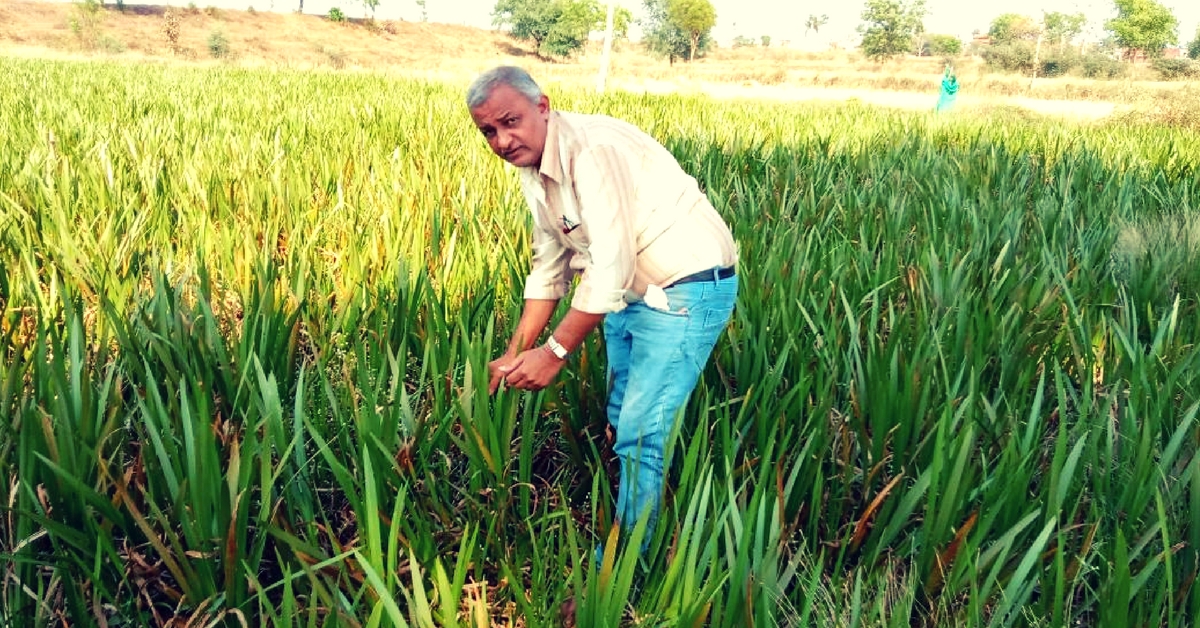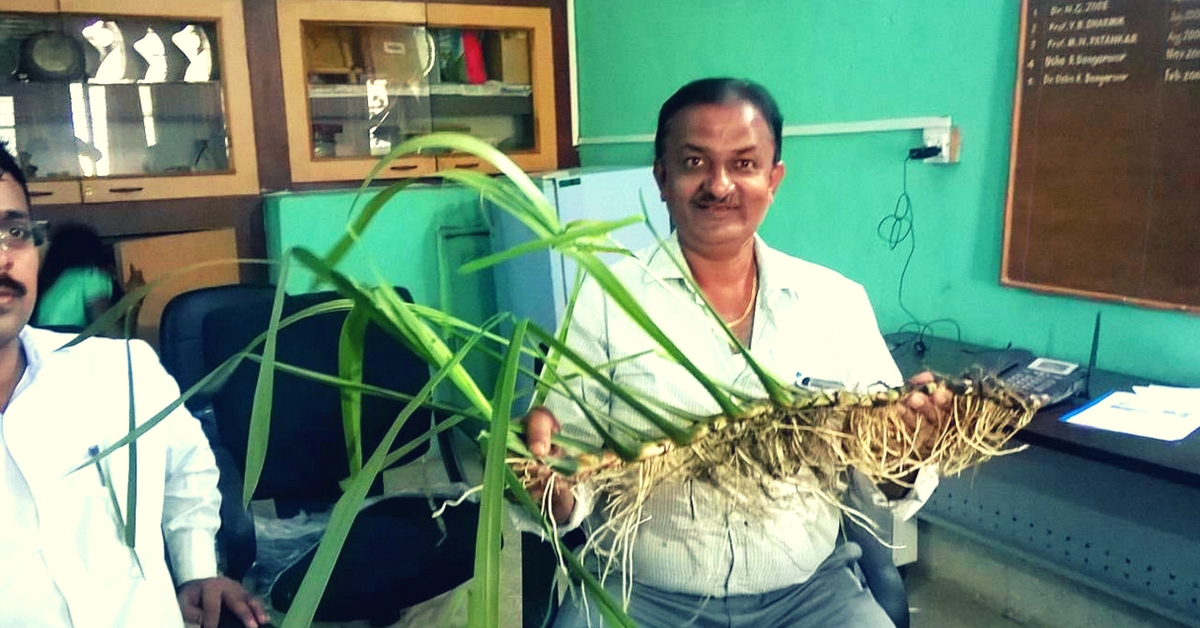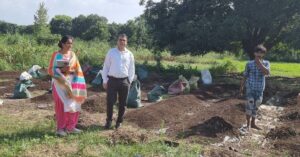This Man Quit His Cushy Corporate Job to Help Farmers Make Organic Pesticides!
Rattled by the increasing farmer deaths and suicides in rural Maharashtra, specifically in Yavatmal and Vidarbha region, this engineer also decided to opt for farming as a second career to alleviate their sufferings.

When most people from villages were migrating to the cities looking for well-paying jobs, Rajesh Gaidhani left a dazzling annual package of Rs 19 lakh P.A and abandoned a 26-year long corporate career to do full-time farming in 2013.
But that wasn’t the only unconventional decision he made.
Rattled by the increasing farmer deaths and suicides in rural Maharashtra, specifically in Yavatmal and Vidarbha region, this engineer also decided to opt for farming as a second career to alleviate their sufferings.

And the journey was no cakewalk. When Rajesh decided to toil in the soil of his native village, where his forefathers grew crops, people mocked him. And while his family wasn’t happy with this decision, they extended their full support without asking him the reason for quitting. And to this day, he considers this support crucial in keeping him motivated.
A graduate engineer with a diploma in business management, the man hardly had any experience tilling the soil. But the one thing he knew was that he wouldn’t undertake conventional farming – at the mercy of chemical pesticides or fertilizers. And thus began his organic farming journey.
What sets this farmer apart from the rest is how he has made a successful business out of medicinal plant cultivation.

On his 16-acre farm in Lakhani, while the farmer uses over 10 acres to grow conventional crops like paddy and rice in Kharif and wheat and channa in Rabi, another six acres is dedicated to the cultivation of medicinal plants like Vekhand (Acorus Calamus), whose properties the farmer has been promoting for a while now.
“When I cultivated the medicinal plant, it was a raging success. I earned a benefit of Rs 1 lakh per acre in the first year itself. The use of Vekhand on my farm has increased its soil fertility from 0.4 to 0.9 (1 stands for 100 percent fertility) in just three years,” says Rajesh, speaking to The Better India.
Not only does the cultivation of this plant help increase soil fertility, but its extract can also be used as an insect repellent in farms. The farmer has been using the extract of Vekhand to keep pests at bay for the last two years in his paddy field successfully.
Shockingly, for years, women in the village preserved food grains using boric powder.
“When a farmer grows food painstakingly using organic manure and bio-pesticides just to ensure the foodgrains are untouched by any kinds of chemicals, it is heartbreaking to see that people have to resort to boric powder, which is a chemical, to preserve it against insects and pests. It just makes the purpose of growing food organically redundant right?”
In another experiment in 2017, the engineer filled four gunny bags with 50 kilos of rice, Channa, wheat and Toor dal each. He powdered the roots of Vekhand and added it to the bags.
For a year, the grains were insect and pesticide free!
“Now while selling my food grains, I tell customers not to add any other preservatives, as I add the Acorus Calamus powder to it, which is already has insect-repellant properties and acts as a natural preservative.
Foodgrains stored in warehouses are exposed to chemical gases to prevent infestation for over six months. During this period, these gases get absorbed in these grains. And while warehouse owners cannot be blamed because they are merely trying to save their grains, they are also unaware of any other alternative that exists.
So, I have been personally visiting farmers and warehouses and asking them to use the Vekhand root powder on an experimental basis. If widely used, it could be an excellent natural preservative for farmers and warehouses to store food grains,” says Rajesh.
In the light of the recent farmer agitations, he says the only way in which farmers can thrive is by improving the quality of their soil and use low-cost farming techniques.

Pesticides and fertilisers, on an average, cost some Rs 5,000- 6,000 per acre. Initially, Rajesh spent some Rs 50,000-60,000 for his 10-acre farm.
But after he switched to making his natural fertilisers and bio-pesticides, he spends a minimal Rs 15,000.
He also encourages farmers first to study their land quality, soil health and water PH.
“How can you grow anything if your land has lost its fertility. Invest a year or two in improving its quality, and you can be sure that you will harvest superior quality crops in the following years,” he says.
Read more: Before ‘Saving The Environment’ Was a Catchphrase, The Chipko Movement Showed Us How It’s Done
Another technique to help farmers maximise profits is to start agro-processing, says Rajesh.
“Farmers think once they harvest their crop, their work is finished. But the job is only 50% done. If a potato farmer sells a kilo for Rs 5, he is at a complete loss if the potato chip seller sells it at Rs 200 per kg! But a facility that can let local farmers dehydrate or process their perishable products will safeguard them from fluctuations in market prices,” he says
Apart from Vekhand and its extract, Rajesh also produces a range of products under his venture, Organic Herb Lakhia Farm, like super fine rice called ‘Bhandara special’, aromatic rice, brown rice, natural rice, wheat, dried roots etc.
Rajesh also conducts free-of-cost training sessions for farmers on low-cost natural farming, on-farm preparation of organic manure, bio fertilisers and bio-pesticides and improving soil health in various remote villages across India.

In the last three-years Rajesh has had over a hundred farmers, in addition to government officials and NGOs, visit his farm for many of these educational and training sessions.
If his story inspired you, get in touch with Rajesh Gaidhani at 7517896559 or WhatsApp him on 9423112684. You can visit his website here or email him at [email protected].
(Edited by Vinayak Hegde)
Like this story? Or have something to share?
Write to us: [email protected]
Connect with us on Facebook and Twitter.
NEW: Click here to get positive news on WhatsApp!
If you found our stories insightful, informative, or even just enjoyable, we invite you to consider making a voluntary payment to support the work we do at The Better India. Your contribution helps us continue producing quality content that educates, inspires, and drives positive change.
Choose one of the payment options below for your contribution-
By paying for the stories you value, you directly contribute to sustaining our efforts focused on making a difference in the world. Together, let's ensure that impactful stories continue to be told and shared, enriching lives and communities alike.
Thank you for your support. Here are some frequently asked questions you might find helpful to know why you are contributing?


This story made me
-
97
-
121
-
89
-
167














